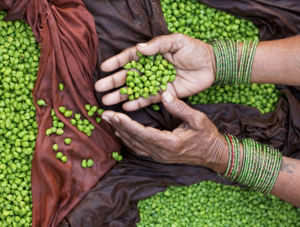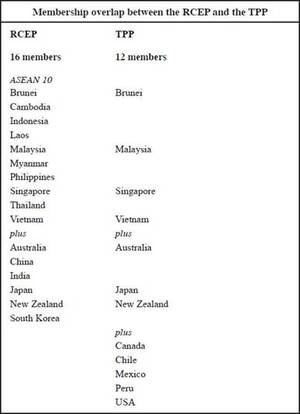The stringent intellectual property rules being pushed for adoption by some RCEP members will have an adverse effect on the livelihoods of small and traditional farmers in poorer member states, warns Shalini Bhutani.
Governments in the Global South are known to be wary of 'TRIPS-plus' rules on intellectual property (IP), including in the seed sector. However, IP protection standards at a level higher than that mandated under the World Trade Organisation (WTO) Agreement on Trade-Related Aspects of Intellectual Property Rights (TRIPS), continue to be pushed for in the mega-regional free trade agreements (FTAs) under negotiation. This is particularly true of the Regional Comprehensive Economic Partnership (RCEP) that is on the table between ASEAN and its six existing FTA partners.
Another planned mega-regional trade pact, the Trans-Pacific Partnership (TPP) signed in February 2016, may die a premature death due to lack of support from the incoming President of the US, a leading member state. The TPP has 12 countries from the Asia and Pacific region, seven of which are also vying to be part of the RCEP (see table next page). Irrespective of the future of the TPP, however, it has been able to export its 'TRIPS-plus' IP standards into the RCEP negotiations.
The TPP's chapter on intellectual property rights (IPRs), which sets higher levels of protection than the TRIPS Agreement, is designed to be the new 'gold standard' for IP rules in trade agreements. There is a risk of spillover effects from the TPP on the RCEP, given the overlapping membership between the two.
The concerns of ordinary citizens in countries negotiating the RCEP are therefore not misplaced. Those RCEP members taking a more cautious approach on expanding IP rules will be under pressure to go beyond their currently TRIPS-compliant domestic laws. These governments will need to stay strong for their small farmers and peasant cultures, in view of the potential adverse effects of TRIPS-plus norms on the seed sector.
Seed freedoms under threat
The current IP text (leaked in October 2015) proposed for the RCEP pushes for accession by all RCEP member states to the 1991 Act of the International Convention for the Protection of New Varieties of Plants (UPOV 1991). Among the RCEP's 16 countries, seven are already members of UPOV: Australia, China, Japan, New Zealand, Singapore, South Korea and Vietnam. The other RCEP countries which are not UPOV members, including India, are coming under pressure to join UPOV 1991 - the most stringent version of UPOV - to provide IP protection for plant breeder rights (PBRs) at the cost of farmers' rights.
India already has a PBR law on seeds called the Protection of Plant Varieties and Farmers' Rights Act, 2001. The Act has intentionally been kept less stringent than UPOV 1991 to allow farmers to continue with their seed practices, imposing only a restriction on sale of packaged seed of protected plant varieties. This space for both small farmers and public breeders is at risk of being lost if countries like India relent to amending their PBR laws in line with UPOV 1991.
Seed laws the world over are already becoming more restrictive for farmer seed systems. The seed industry in India (through the National Seed Association of India) and in the region (through the Asia & Pacific Seed Association) has been lobbying governments for harmonisation of seed laws.1 It is against any dilution of UPOV 1991 standards that would allow for farmers' freedoms at the cost of economic rights of corporate breeders.
People's knowledge on biodiversity
Another area where IP rules can have a serious impact on livelihoods is biodiversity-based people's knowledge. India is the only RCEP country that has explicitly proposed the inclusion of 'traditional knowledge' in the agreement text. The proposal from India raises several points relating to genetic resources, traditional knowledge and folklore. These are in line with the international Convention on Biological Diversity (CBD), but are opposed in the RCEP talks by Japan, South Korea, Australia and ASEAN.
All RCEP countries are already members of both the WTO and the CBD. In fact, many of the RCEP countries had previously come together in the 17-member Like-Minded Megadiverse Countries (LMMC) group of nations which are rich in biodiversity. Their shared interests with respect to preventing 'biopiracy' and promoting fair sharing of benefits from the use of genetic resources need to be remembered.
India has been seeking a 'biodiversity amendment' to the TRIPS Agreement,2 while having amended its national patent law to insist on disclosure of the country of source and geographical origin for patents sought on traditional knowledge. Like other biodiversity-rich countries in the region, it has previously had problems with 'biopiracy' from user countries like Japan. Japanese companies such as the brewer Sapporo have in the past sought patents on India's genetic resources and people's knowledge, sans any benefit sharing or prior informed consent.3
Under the Indian proposal in the RCEP negotiations, RCEP countries must become members of the Nagoya Protocol, a sub-treaty under the CBD on access to genetic resources and benefit sharing. Meanwhile, as a sign of the challenges faced in this area, India's own regulations on access and benefit sharing, issued in November 2014 in compliance with the Nagoya Protocol, have been challenged by Ayurvedic medicine manufacturers opposed to benefit-sharing obligations that they view as a 'double tax'.4
The protection of people's knowledge and their priority access to their local biological resources is, however, not articulated as a non-negotiable in the RCEP talks. There are currently no exceptions envisaged to the RCEP rules to safeguard people's knowledge (unlike the 'exception clause' that would enable the New Zealand government to provide preferential treatment to the country's indigenous Maori population in accordance with the Treaty of Waitangi).
Data exclusivity
There is another aspect of IP that is intrinsically linked with the seed discussion: data exclusivity on agricultural chemicals. While the demands of agroecology require that we move our farming systems away from use of harmful chemical fertilisers and pesticides, the fact is that wherever the mainstream industrial model of agriculture prevails, it remains chemical-intensive.
The stronger RCEP members with agribusinesses which have an interest in marketing their agrochemicals in the Asia and Pacific region will insist on data exclusivity to de facto extend the patent protection periods of their products. This would also act as a disincentive against cheaper generic versions.
IPR enforcement
Enforcement implies compelling the observance of laws, and the strict application of laws cannot happen without the support of state machinery. So it is with IP. Those promoting a maximalist IP agenda insist that IP laws should not only be passed but also be strictly enforced. The remedies typically include civil, criminal or administrative remedies. It can mean heightened demands on customs officials to check for and take action against what may be classified as 'counterfeit' goods. Demands for IPR enforcement by trading partners can also take the form of an insistence on border measures to check if generic versions of IP-protected goods are crossing borders.
The stress on enforcement outside of the WTO is among the reasons certain countries may not want to move away from the WTO's minimum IP standards. It is also the reason the RCEP countries which want higher IP standards and face resistance on that front, are now contemplating making the demand for strict IPR enforcement.
Domestic measures
RCEP countries might also be undertaking unilateral measures on IP at the domestic level which may lock them into positions at the negotiating table.
For example, India's new National IPR Policy 2016 states that the government will 'engage constructively in the negotiation of international treaties and agreements in consultation with stakeholders; examine accession to some multilateral treaties which are in India's interest; and become signatory to those treaties which India has de facto implemented to enable it to participate in their decision making process'. This could go against the strong position against UPOV that India has so far taken in the RCEP talks.
Japan's lower house of Parliament has already ratified the TPP and passed a law related to the TPP (even though the chances of the TPP entering into force seem bleak after Donald Trump's win in the US presidential election). Committing to the TPP level of IP protection gives countries a reason to demand the same standards in their other trade negotiations. Indeed, Japan has, along with South Korea, been placing strict IP demands on the other RCEP countries.
Conclusion
Balancing internal and external pressures in the RCEP negotiations will be a tightrope walk for governments, with small farmers and seed savers seeking freedoms in their seed practices rather than free trade with not-so-free IP rules.
Citizens and people's groups will have to stay watchful against any TPP-style IP standards being slipped into the RCEP, even if the TPP itself does not become a reality. The entire RCEP negotiating process also needs to be opened up to allow for more public debate.
Meanwhile, trade negotiators need to be aware that, particularly with respect to IP, 'TPP-plus' can be worse than 'TRIPS-plus'!
Shalini Bhutani is a Delhi-based legal researcher and policy analyst who works on trade issues across the Asian region.
Source: http://www.twn.my/title2/resurgence/2016/314-315/cover05.htm
1 For the love of the seed industry. http://indiatogether.org/indian-seed-congress-2015-agricultural-alliance-between-industry-and-public-sector-agriculture
2 https://www.grain.org/article/entries/711-trips-close-call-in-geneva
3 http://www.downtoearth.org.in/blog/japanese-biopiracy-of-our-ballia-barley-43533
4 Ayush cos move Bombay HC against enforcing ABS compliance. http://www.pharmabiz.com/NewsDetails.aspx?aid=92576&sid=1

